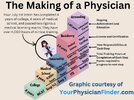- Joined
- Jul 9, 2022
- Messages
- 243
- Reaction score
- 724
- Points
- 116
- Attending Physician
Advertisement - Members don't see this ad
What if we all employed NPs in our outpatient practice and supervised them closely - by which I mean constant, ongoing supervision and review of each and every note/encounter?
Then we'd define what quality looks like when if comes to NP practice, and answer the "what do we do about the shortfall of psychiatrists" question on our own terms, or as near to our own terms as we're going to get.
Then we'd define what quality looks like when if comes to NP practice, and answer the "what do we do about the shortfall of psychiatrists" question on our own terms, or as near to our own terms as we're going to get.


